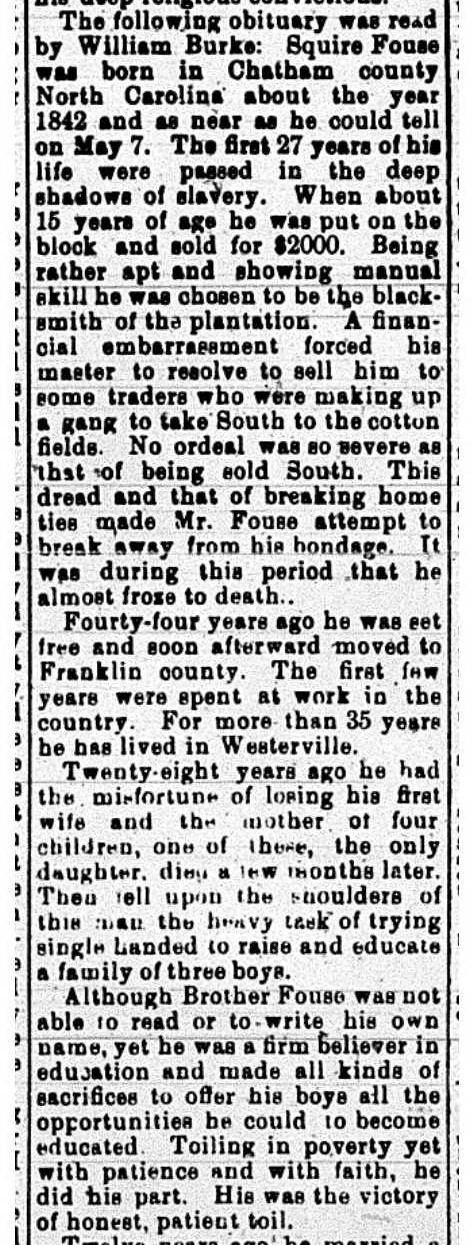The powerful legacies of slavery actively shaped the choices of formerly enslaved people who moved to Westerville, even after slavery ended.
Slavery had the power to permanently reshape families. Eveline and her husband Cyrus Williams were enslaved on a plantation in Virginia. Their owner sold Eveline and their three young children away. She may have assumed that their relationship was over. Since Virginia did not legally recognize enslaved peoples’ marriages, she remarried a man named John Monroe, and they eventually moved to Westerville. One day Cyrus showed up, surprised to discover that Eveline was “happily” married to John. We do not know how Eveline felt about seeing Cyrus again, what their children’s reactions were, or how John reacted. Cyrus left, and Eveline lived out the remainder of her life with John.[1]
Slavery also shaped the trajectory of the Fouse family. Squire Fouse had been enslaved in North Carolina and eventually made his way to Ohio. Squire’s obituary described how because he didn’t know how to read or write, he “was a firm believer in education and made all kinds of sacrifices” to send his children to school. His son William become the first Black graduate of Westerville High School and Otterbein University. During Otterbein’s commencement, he gave a stirring speech about the centuries of Black struggle in the US and how he could see a day of justice dawning. William received an honorary doctorate from Otterbein in 1937. As principal of a Black high school in Lexington, Kentucky, he worked tirelessly to provide educational opportunities for Black youth.[2]
Definitions
The recipient of an honorary degree does not complete the normal academic requirements for a degree from a university; instead, the university awards it as a way to honor that person’s achievements.
[1] Ancestry.com, 1860 United States Federal Census [database on-line], Provo, UT, USA: Ancestry.com Operations, Inc., 2009; Ancestry.com, Ohio, U.S., County Marriage Records, 1774-1993 [database on-line], Lehi, UT, USA: Ancestry.com Operations, Inc., 2016; Public Opinion, 08/25/1898 and 3/15/1928.
[2] Public Opinion, 3/4/1909; correspondence from William H. Fouse to Mrs. George Alexander (F10004), File on Fouse, William H. (F10), 5/22/1927, Westerville History Museum.
How to Cite This Source
Please cite this toolkit (Chicago Manual of Style) as 'Westerville History Museum, "Racism in Westerville History," Westerville Public Library, last modified January 23, 2023, https://westervillelibrary.org/racism-history.
Need a citation in a different style (such as MLA or APA)? Try this citation generator.





